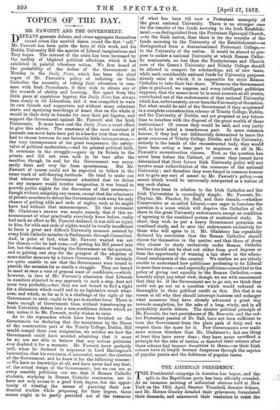TOPICS OF THE DAY.
MR. FAWCETT AND THE GOVERNMENT.
As to the reproaches which have been lavished on the Government for declaring that the acceptance by the House of the constructive part of the Trinity College, Dublin, Bill would compel their own resignation, we neither see how the Government could have avoided admitting that it must be so, nor are able to believe that any serious politician ever doubted it for a moment. Mr. Fawcett knew perfectly well, when he declined to acquiesce in Lord Hartington's instruction, that his resistance, if successful, meant the ejection of the Government, and he knew it for the following reasons : —We have no knowledge at all, and have never had any hint, of the actual design of the Government ; but we can see, as every sensible politician can see, that if Roman Catholic students, studying in Roman Catholic seminaries, are to have not only access to a good Irish degree, but the oppor- tunity of winning the means of pursuing their aca- demical studies while preparing for their degree, these means ought to be partly provided out of the resources of what has been till now a Protestant monopoly of the great national University. There is no stronger case for the transfer of the funds accruing to the Irish Establish, ment,—as distinguished from the Protestant Episcopal Church, —to the Irish nation, than there is for the transfer of the funds accruing to the University of the Establishment—se distinguished from a denominational Protestant College,— to the University of the nation. It would be absurd to pro- pose to endow a national University at which Roman Catho- lic seminarists, no less than the Presbyterians and Church men of the Queen's University and Trinity College shoal be allowed to compete for scholarships, out of new taxes, while such considerable national funds for University purposea already exist in which it is impossible for strict Roman. Catholics to take their fair share. Whenever the Government plan is produced, we suppose, and every intelligent politician. supposes, that the means must be in some measure at all events., contributed out of the endowments of that national University which has, unfortunately, never been the University of the nation.. But what would be said of the Government if they acquiesced' in a complete reconstruction scheme of Trinity College, Dublin, and the University of Dublin, and yet proposed at any future time to interfere with the disposal of the great wealth of these institutions Of course they would be said, and very justly said, to have acted a treacherous part. In mere common, honour, if they had not deliberately determined to leave the great resources of Trinity College, Dublin, and the University, entirely in the hands of the reconstructed body, they wool& have been acting a base part to acquiesce at all in Mr. Fawcett's reconstruction clauses. Now, as the question has never been before the Cabinet, of course they cannot have determined that their future Irish University policy will not involve some redistribution of the resources of the national University ; and therefore they were bound in common honour not to give any sort of assent to Mr. Fawcett's policy,—an. assent which would be universally interpreted as a waiver of any such claims.
The true issue in relation to the Irish Catholics and the Irish Universities is exceedingly simple. Mr. Fawcett, Dr. Playfair, Mr. Plunket, Dr. Ball, and their friends,—whether Conservative or so-called Liberal,—are eager to foreclose the question in a sense which will deprive the Catholics of all. share in the great University endowments, except on condition. of agreeing to the combined system of academical study. In. short, they wish to put a heavy Government premium on. combined study, and to save the endowments exclusively for those who will agree to it. Mr. Gladstone has repeatedly declared his conviction that the Roman Catholics should choose for themselves in the matter, and that those of them who choose to study exclusively under Roman Catholic teachers should not be shut out either from good degrees or from the opportunity of winning a fair share in the educa- tional emoluments of the country. We confess we are utterly unable to understand how politicians professing to be Liberal in more than name,—and especially politicians committed to the policy of giving real equality to the Roman Catholics,—can honestly adopt any other view, though we see with amazement that they do. If the Government are to go out, we think they could not go out on a question which would redound so thoroughly to their political credit as this. But that is ne reason at all why they should interrupt business and endanger what measures they have already advanced a great way towards completion, for the sake of a long, windy, and in all probability sterile debate. The sinister political principle of Mr. Fawcett, the tart peevishness of Mr. Bouverie, and the red- hot Protestant passion of Dr. Ball, have not been sufficient to- turn the Government from the plain path of duty, and we respect them the more for it. Few Governments ever made more serious blunders than Mr. Gladstone's ; but one thing at least they have never done ; they have never sacrificed a principle for the sake of tactics, or deserted their colours after- those colours had become dangerous to them,—as their Irish ouluurs have at length become dangerous through the caprice of popular panics and the fickleness of popular tastes.


































 Previous page
Previous page